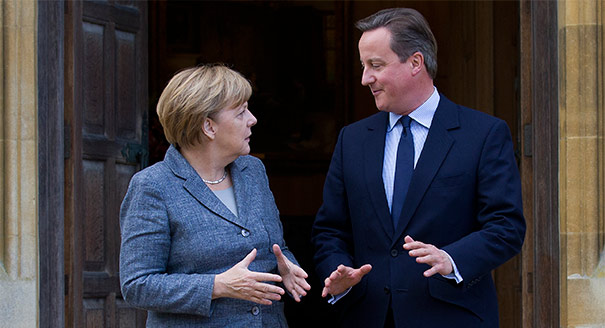As 2015 draws to a close, Judy Dempsey and Jan Techau pick their winners and losers of the year and briefly ponder how their choices will fare in 2016.
Winners of the Year
Judy Dempsey: Recep Tayyip Erdoğan sure knows how to play the refugees off against the EU—and win. This is what happened at an
EU-Turkey summit on November 29, when EU leaders gave the Turkish president almost everything he wanted. That included €3 billion ($3.3 billion) in aid for the
2.3 million Syrian refugees who are in Turkey; promises to open more chapters of the country’s EU accession negotiations; and the big prize long sought by Ankara—an end to the visa requirement for Turks visiting the EU’s passport-free Schengen area.
EU leaders, especially Angela Merkel, were desperate for a deal. Forget about the German chancellor’s antipathy toward Turkey one day joining the EU. Forget about the erosion of civil rights and press freedom. Forget about the detention of Erdoğan’s critics. Realpolitik took precedence over values as Berlin wanted help in curbing the exodus of refugees from Turkey to Europe.
Erdoğan will have to deliver on his side. That means protecting the EU’s external borders and improving the conditions for the refugees. Yet the concessions the EU made could also end up being a victory for Europe. The time when Cyprus could block the opening of more chapters of Turkey’s accession negotiations is over. Another win for Erdoğan—but also for Brussels and those member states that don’t want to lose Turkey.
*
Jan Techau: David Cameron—despite his apparent failures. In good old British Conservative tradition, the UK prime minister got it all wrong on Europe. He gave the EU-bashing loonies in his party red meat to placate them, but instead they got hungrier. He withdrew from the European People’s Party in the European Parliament to look principled and as a result lost enormous amounts of influence in Brussels.
Cameron thought his (not entirely unreasonable) ideas on European reform would forge an alliance of pragmatists, but instead the only other EU governments backing him are populists. As a consequence, he will get few real reforms from his peers in Brussels as he seeks to redefine Britain’s relationship with the EU, but he will have to accept that meager loot and take it home to sell as a major trophy to Euroskeptic audiences.
Cameron’s position is impossible. And yet he will win the British referendum on EU membership that will probably be held in 2016, not because he is so brilliant, but because the British are not suicidal. His triumph will be big, even though he will have done little to score it. And he will be the Winner of the Year again in 2016.
Losers of the Year
Judy Dempsey: NATO is approaching its 2016 summit in Warsaw in bad shape. Yes, the alliance has won plaudits for taking a more robust approach to the security concerns of its Eastern members after Russia’s March 2014 annexation of Crimea and invasion of eastern Ukraine. But NATO has little else to boast about. Its combat mission in Afghanistan that ended in December 2014 has not brought stability or peace to the country.
Closer to home, it is extraordinary to see a military organization so passive in helping allies and partners deal with the gargantuan refugee crisis. Despite all its kit and availability of troops, NATO didn’t help Greece or the Western Balkan countries manage their borders, provide security for the refugees, or help airlift humanitarian aid and medical supplies for the refugees.
As for NATO’s enlargement policy, it’s a shambles. The alliance is set to admit Montenegro as a new member at the Warsaw summit. But NATO remains craven: beholden to Greece for refusing to admit Macedonia and to Russia for refusing to offer Georgia even a Membership Action Plan, a program that paves the way to membership. NATO’s mantra that each country is free to choose its alliances and that NATO is not subject to any veto by outsiders is too worn to have any credibility. A big loss for both sides.
*
Jan Techau: Angela Merkel—despite her apparent successes. In 2015, after ten years in office, the German chancellor finally found her topic.
In the past decade, she has scored three election victories, excelled during seven years of feverish crisis management to save the euro, pulled off a unilateral U-turn on nuclear energy, and surprised Russian President Vladimir Putin with her unexpectedly tough leadership vis-à-vis Russia after its March 2014 annexation of Crimea.
But it took 1 million refugees landing in Germany from Syria, Africa, and Central Asia to bring out the real Angela Merkel. In the refugee crisis, her head and her heart merged: the coolheaded scientist and bighearted Mutti became one. She was praised, rightly, for being the only European leader who did not succumb to the politics of fear. Time magazine made her Person of the Year. So did the Financial Times. At a critical party conference in December 2015, she conquered her own skeptical Christian Democrats by invoking human dignity, God’s gift to every single human being, and she meant it.
And yet it is the politics of fear that runs Europe, from Budapest to Warsaw to Paris to Copenhagen. Merkel’s morals have alienated her from her fellow leaders. They see those morals as uniquely German and exercised at their expense, and there is some truth in that view. Many Germans are not convinced either. Europeans are worn out, fearful of the future, inward-looking, and scared mindless of an identity loss imposed by what they see as millions of poor brown people. Merkel’s exemplary leadership will shine. But a lonely shine it will be.











